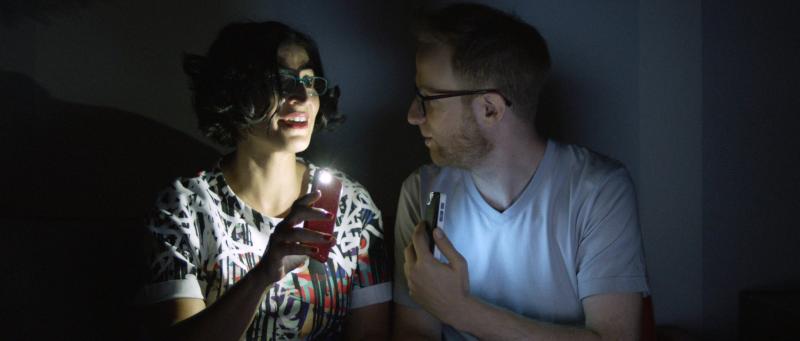MOVIE REVIEW: '3rd Street Blackout' Charms At The L.A. Film Fest

“3rd Street Blackout” premiered at the L.A. Film Festival to an Angeleno film snob riot. LAFF oversold the screening, which usually isn’t a problem; but usually films don’t capture viewers’ affection quite like “3rd Street Blackout.” Many of the rejected (and irate) waitlisters came back Monday for a second screening, which was just as packed as the first.
The film (over)sold out twice for good reason. Negin Farsad and Jeremy Redleaf, who are the writers, directors and stars, did something really difficult with their first co-created feature-length: they captured the whimsy of the quirky rom-com genre without falling into its corporatized clichés. It’s heartwarming but not sugary, eccentric but not twee, and one of my favorite movies of the year.
READ MORE: '3rd Street Blackout''s Negin Farsad On Being A 'Hyphenated American' Female Filmmaker
Farsad and Redleaf play Mina and Rudy, a typical twenty-to-thirty-something techie couple living in New York City. He is a software developer, she is a neuroscientist who gives TED Talks; they live on the Lower East Side and have not one, but two, Rokus. The beginning of the film focuses on the technology that surrounds their relationship, from texts to Netflix – even when a hurricane hits New York, they see the storm play out on screens instead of out their windows.
But then the lower half of Manhattan loses power for several days, forcing Mina and Rudy off the grid to confront what happened at Mina’s TED conference face-to-face…or at least with paper notes instead of virtual.
READ MORE: 6 Anticipated Films At The L.A. Film Festival
Rudy and Mina are the dream nerdy-cool couple, with rambling, mostly believable banter that’s a snappier version of real life (their “rap battles” are a highlight). Mina, with her kooky glasses and awkward-but-cute quips, is one step short of the Manic Pixie Nerd Girl, but Farsad keeps her off-kilter enough to dodge the cliché. For the most part, the movie is a gently mocking portrayal of the hackathon- and IPA-filled yuccie world that Mina and Rudy occupy. It’s slight satire expressed best through the host of Rudy’s hackathon, who’s stuck on “disruption” as the Next Big Thing (“You bring an app to me, I want it to disrupt so hard it tears an anal fissure in the tech world's rectum,” he announces).
The film doesn’t take itself too seriously. It’s an unapologetic –and very enjoyable – lighthearted romp. But it manages to tackle some larger issues without losing its humor. The main message is obvious enough: we should look up from our phones once in a while and appreciate the people [physically] around us. But what’s conveyed more subtly is that the Internet curbs diversity in our social circles by allowing us to create an environment full of only people like us.
“3rd Street Blackout” is about finding friendship in people of all ages, ethnicities and sexual orientations, without ever batting an eyelash or making the characters “about” their diversity or into token minorities (something especially important for Farsad, who stands out for being both female and Iranian-American in the directing world).
That light-handed approach is what makes “3rd Street Blackout” so special: where the characters might fall into “types,” like the Deschanel quirky girl or McCarthy wisecracker, they’re funny (and weird) enough to dodge the pigeonhole.
The movie hangs onto the eccentricity that so often devolves into hackneyed kitsch in big-budget “indie” blockbusters. As Redleaf and Farsad mentioned in the Q&A after the screening, “3rd Street Blackout” was a small-budget film, fundraised one minor contribution at a time. But I can’t bring myself to feel bad they didn’t have millions to produce it; the end result is something much more valuable than what a fat budget would have bought.
Contact Editor-in-Chief Gigi Gastevich here.



